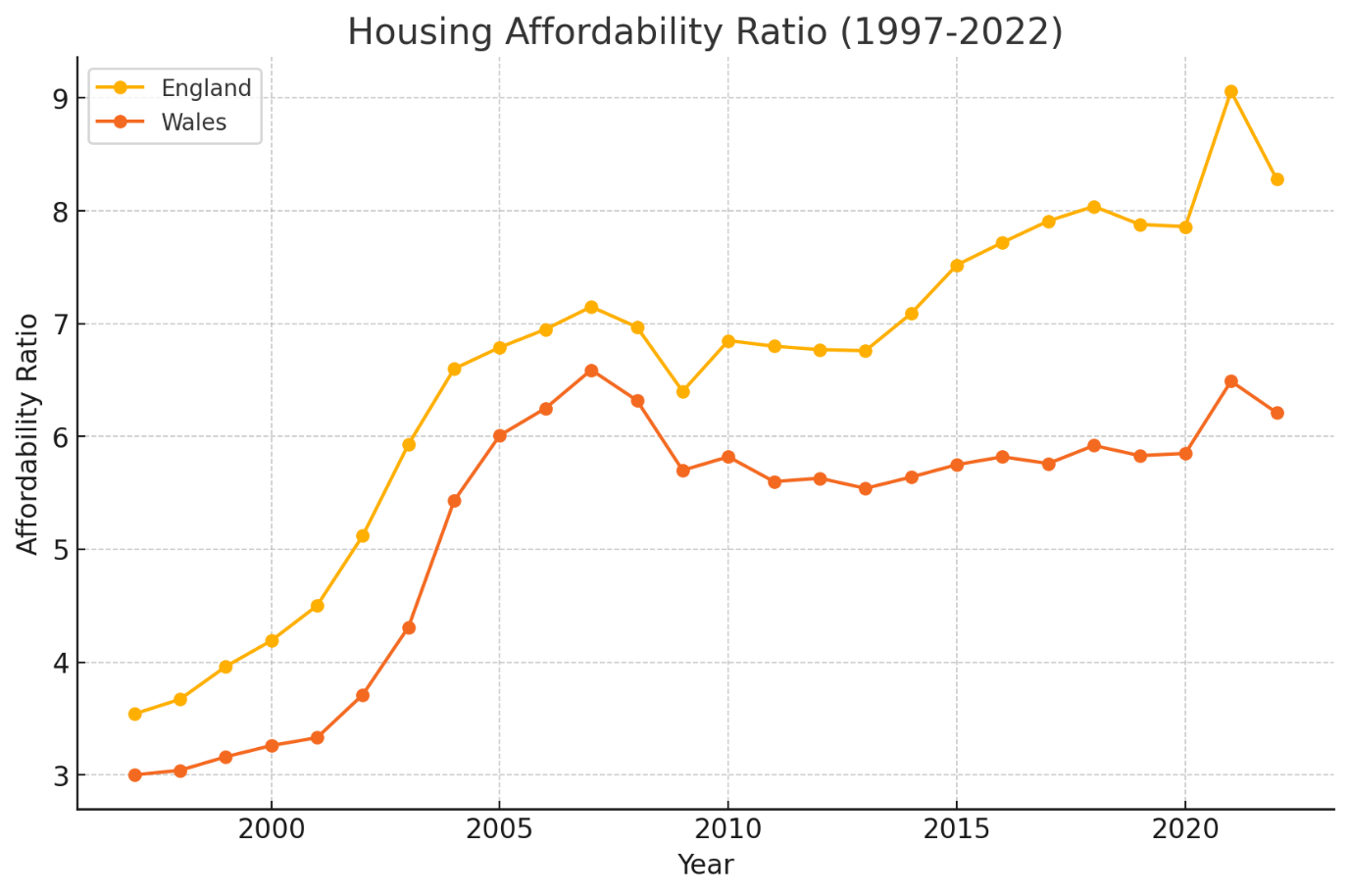We need a property Tsar, says new report

We all know first time buyers are struggling. Data from the Office for National Statistics shows the average house price has risen from below four times average earnings in 1998 to more than six times average earnings in Wales and eight times average earnings in England. Not only is it incredibly hard to find a home that they can afford a mortgage for, but even getting a deposit together is a major difficulty for some.
 In its latest property report, the country’s third biggest building society, Yorkshire Building Society, has asked for major reforms in the UK housing sector, including a call for the appointment of a “Housing Tsar” to tackle the nation’s deepening housing crisis. For years, the UK has struggled with complex and persistent housing challenges - high property prices, rental inflation, and an imbalance between supply and demand - but YBS argues that no cohesive plan has emerged to address these issues effectively.
In its latest property report, the country’s third biggest building society, Yorkshire Building Society, has asked for major reforms in the UK housing sector, including a call for the appointment of a “Housing Tsar” to tackle the nation’s deepening housing crisis. For years, the UK has struggled with complex and persistent housing challenges - high property prices, rental inflation, and an imbalance between supply and demand - but YBS argues that no cohesive plan has emerged to address these issues effectively.
“Analysis and policy discussion around the UK housing market typically takes on two perspectives,” said the report. “One is an entirely top-down view, which looks at aggregate data such as house-building figures or average prices. The other is often too narrow and granular, looking to solve a problem in one particular market segment, and usually a demand-side initiative.”
The report emphasises that previous Conservative government measures, while well-intentioned, have been piecemeal at best. The report advocates for a more holistic approach, where a dedicated figure - a Housing Tsar - would be appointed to take charge, ensuring that the housing crisis is given the consistent attention it demands.
How affordable is your region?
|
Region name |
Ratio |
|---|---|
|
North East |
4.91 |
|
North West |
6.19 |
|
Yorkshire and The Humber |
6.17 |
|
East Midlands |
7.45 |
|
West Midlands |
7.12 |
|
East |
10.08 |
|
London |
12.54 |
|
South East |
10.75 |
|
South West |
9.41 |
|
Wales |
6.21 |
(ONS stats 2022)
One of the report’s central critiques is the fragmentation in policy. Successive governments have often introduced new regulations and changes, but without long-term, strategic vision. For example, planning reforms have not kept pace with the rapidly changing demographics, such as the rise in multi-generational households or the increasing need for smaller homes due to downsizing. The Yorkshire Building Society argues that a Housing Tsar could oversee these concerns, integrating different strands of the housing debate into a coherent national policy.
Moreover, the Tsar would serve as a key figure in addressing environmental concerns tied to housing. The UK’s carbon emissions from housing make up 21% of the nation’s total emissions, and retrofitting existing homes for energy efficiency is a daunting task. The report highlights the urgent need for clear, structured guidance for homeowners and landlords on how to upgrade their properties, potentially through incentivized green loans or tax breaks. The Tsar would ensure that these environmental goals are woven into the larger housing strategy.
The Yorkshire Building Society envisions this role as more than just a symbolic position. It proposes that the Housing Tsar would have powers akin to those of the Climate Change Committee, able to monitor progress, set goals, and hold various stakeholders accountable - from developers and landlords to government agencies. Such a figure would push housing issues to the forefront of political and economic conversations, making sure that long-term plans are not derailed by short-term political shifts.
The report closes by emphasizing that while bold ideas like appointing a Housing Tsar may seem radical, they are essential for navigating the housing market’s complexities. With housing availability and affordability at crisis levels, the UK requires a coordinated, ongoing effort. The Tsar would be instrumental in unifying the efforts of the government, private sector, and civil society to finally build a housing policy that works for all.
YBS also uses the report to promote its £5,000 deposit mortgage offering first homeowners a way on to the housing ladder – it isn’t available, however, for flats or new-builds.
The report in a nutshell:
- Appointment of a Housing Tsar:
- A dedicated government figure to oversee housing strategy and elevate housing issues to the top of the political agenda, ensuring consistent attention and action.
- Independent house-building oversight:
- Creation of an independent body, similar to the Climate Change Committee, to monitor house-building targets and ensure the planning process is fit for purpose.
- Holistic planning reform:
- Ensure planning reforms consider demographic changes, multi-generational living, and new working patterns. This includes better utilisation of brownfield and greyfield sites.
- Fit-for-purpose housing strategy:
- Develop a long-term housing plan that transcends party politics and addresses the needs of various population segments (e.g., downsizers, families, hybrid workers).
- Targeted support for first-time buyers:
- Propose a new government scheme similar to Help to Buy, but better targeted to first-time buyers most in need, and applicable to all property types, not just new builds.
- Support for energy efficiency and green retrofitting:
- Incentivise first-time buyers and homeowners to retrofit homes for energy efficiency by offering additional financial assistance and green mortgages.
- Mortgage interest tax relief for responsible landlords:
- Reinstate mortgage interest tax relief for landlords meeting health, safety, and energy efficiency standards to reduce costs and prevent further rent increases.
- Expansion of rent-to-buy schemes:
- Encourage private investment and government incentives to expand rent-to-buy options for first-time buyers, making homeownership more accessible.
- Stamp duty incentives for downsizing:
- Introduce stamp duty waivers for homeowners downsizing, helping release larger homes back into the market and addressing housing shortages.
- Government support for commercial-to-residential conversions:
- Provide grants or subsidised loans for converting underutilised commercial properties into residential housing, helping meet housing demand and revitalising urban centres.
- Coordinated approach for green services:
- Collaborate between government, lenders, and suppliers to provide better information and access to services for homeowners wanting to improve energy efficiency.
Yorkshire Building Society, the third largest building society in the UK, is headquartered in Bradford, West Yorkshire. Susan Allen is the current CEO, who took on the role after serving as head of customer transformation at Barclays. She has 25 years of experience in financial services, including senior positions at major UK retail banks.
With over £60 billion in assets as of December 2023, it is part of the Building Societies Association. The society owns the Chelsea and Norwich and Peterborough Building Societies, as well as Accord Mortgages, forming the Yorkshire Building Society Group, which serves three million members and employs 3,300 staff across the UK.
Yorkshire Building Society operates through 132 branches and 99 agencies, providing financial services directly. Its commitment to mutuality, affirmed in a 1995 review, ensures it remains accountable to its members rather than shareholders.
Founded in 1864 as the Huddersfield Equitable Permanent Benefit Building Society, the society evolved through mergers, adopting its current name in 1982. Notable mergers include those with Barnsley Building Society in 2008 and Chelsea Building Society in 2010. In 2011, Yorkshire acquired the Egg savings and mortgage business from Citi.



